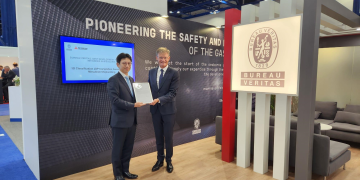Gard Club has recently published an updated Guide on Stowaways to address the issue and inform interested parties of ways to handle stowaway incidents onboard.
Stowaways frequently appear or are discovered by the crew two or three days after the ship has left port. The report stresses that when this happens, immediately notify the company and the P&I insurer as this will enable the CSO to inform the appropriate authorities at the next port of call.
The P&I correspondents and the ship’s agent in the next port of call or the port of embarkation should also be notified, so that they can prepare for identification and repatriation of the stowaway. Generally, repatriation cannot be carried out if advance notice of the stowaway has not been provided.
Treatment of stowaways
- Any stowaways found should be placed in secure quarters, guarded if possible, and be provided with adequate food and water.
- They, as well as the place they were found, should be searched for any identification papers.
- Where there is more than one stowaway, they should preferably be detained separately.
- The master and crew should act firmly, but humanely. Regardless of how inconvenient or irritating the stowaways may be to the master, crew and shipowner, it is important that the stowaways are treated humanely.
- If needed, the master and crew must also provide the stowaways with medical assistance.
- Stowaways should not be put to work. If working, they will be at an increased risk of injuries which may lead to significant medical and deviation expenses and even claims for compensation. Moreover, many stowaways are not only untrained, but can also be unpredictable and may represent a safety hazard if put to work.
- Some shipowners have also faced claims for wages as a result of putting stowaways to work. These claims have caused additional problems in the repatriation process.
- Ships operating in areas where there is a high risk of encountering stowaways, should consider setting aside a dedicated area where any stowaways can be lodged. The quarters should be furnished quite simply, and any items that can be used to harm the stowaway should be removed.
- The use of handcuffs and other types of restraints may be required in some situations. However, the general recommendation is to use such means only in extreme situations, e.g. if the stowaway is a danger to him-/herself or others, and preferably by external security personnel trained to use such restraints.
- Should a stowaway die during the voyage, the authorities at the next port of call, in co-operation with the relevant embassy, will decide how to proceed, i.e., whether to arrange burial at the port in question or repatriate the body. The body of an unidentified stowaway will normally not be returned to the port of embarkation. However, this practice may vary from country to country and Members are advised to follow the instructions provided by the local authorities and the embassy in question.
IMO guidelines:
Treatment of stowaways while onboard:
- Stowaway incidents shall be dealt with in a manner consistent with humanitarian principles. Due consideration must always be given to the operational safety of the ship and to the safety and well-being of the stowaways.
Disembarkation and return of stowaways:
- All parties involved shall cooperate to the fullest extent possible in order to resolve stowaway cases expeditiously and ensure that an early return
or repatriation of stowaways will take place. - Stowaways arriving at or entering a country without the required documents are, in general, illegal entrants. Decisions on dealing with such situations are the privilege of the country where such arrival or entry occurs.
- Stowaway asylum seekers shall be treated in accordance with international protection principles as set out in international instruments, such as the 1951 Convention and the 1967 Protocol relating to the Status of Refugees, and relevant national legislation.
- Every effort should be made to avoid situations where a stowaway has to be detained on board a ship indefinitely.
- Countries shall allow return of stowaways who have full nationality citizenship status in that country or have a right of residence in that
country. - Where the nationality or citizenship or right of residence cannot be established, the country of the original port of embarkation of a stowaway should accept the return of such a stowaway for examination pending final case disposition.
Collecting evidence
The report also highlights it is important to have as much information and evidence as possible on how stowaways have boarded the ship and how the ship made every effort to prevent stowaways boarding and to find succeeding stowaways prior to leaving port. This includes details of access restrictions, watch arrangements, locked areas, etc.
Depending on the circumstances in each case, the following actions should be considered:
- Search the place the stowaways were found for drugs as stowaways can be used as drug couriers. If drugs are found, the place should be left untouched and sealed off. Photograph or video tape the place where the stowaways, and drugs if any, were found.
- Search the stowaways for identity papers. These documents, if found, must be confiscated as stowaways often try to hide their identity or destroy their identity papers.
- Search the stowaways for various items, including mobile telephones, drugs, and weapons. Document any positive findings and confiscate the items.
- Question each stowaway in detail about when and where the boarding took place. If there more than one stowaway, question each person separately.
- Establish the ship’s security arrangements in place at the time of the boarding.
- Try to establish each person’s reasons for stowing away and the circumstances under which his or her voluntary return may be possible.
- Explain that if economic reasons are behind stowing away, no other country will accept them, and repatriation will be inevitable.
- Make records of the stowaways’ treatment during the voyage, e.g., frequency and types of meals, accommodation, times allowed out and sanitary arrangements, in logbooks and as far as practicable by taking photographs and video.































































